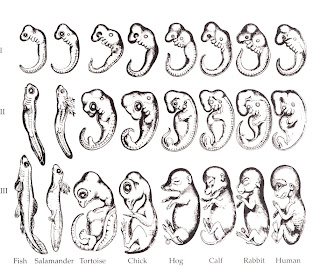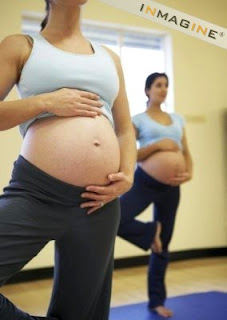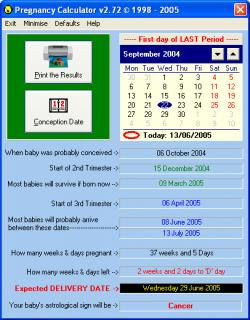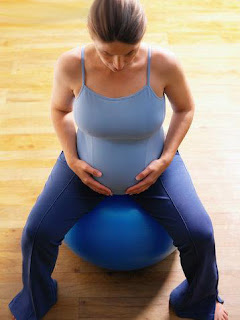By the time your third trimester rolls around, you might be thinking this pregnancy is never going to end! Some things you'll experience include having to urinate frequently due to the baby pressing into your bladder (not fun!). Other symptoms that may be predominant are excessive gas, increasing fatigue, constipation and digestive problems, headaches and back pain. Sounds pretty crazy, doesn't it?! Well, don't let this overwhelm you, because not every women experiences all of these symptoms all of the time. Basically, firm massage of these areas and warm baths were the only things that helped alleviate the cramps.
As the time of birth approaches, your baby is completing development. Now is the time to prepare yourself for the birth process. If you can't attend one of these courses, don't worry - there are still plenty of great books and material to be found. This means no lifting heavy items or participating in excessive exercise and sports.
• Get off those feet, and get plenty of rest.
• Continue eating a healthy diet, and that means healthy food choices, NOT limiting your food intake. Your baby needs nourishment, so now is not the time to worry excessively about your weight gain.
Read more...
19.3.09
Pregnancy - Your Third Trimester
17.3.09
Never Ignore Ectopic Pregnancy Symptoms - It is an Emergency
Ectopic pregnancy symptoms start occurring when the egg is fertilized outside the uterus and the baby starts developing outside the womb. Most commonly, ectopic pregnancy occurs inside the fallopian tube, but in some cases, though quite rare, it occurs in the ovary or the stomach area. Ectopic pregnancy symptoms are abdominal and are characterized by pelvic pain and vaginal bleeding. These are often confused with the pregnancy symptoms of miscarriage or pelvic inflammatory diseases. The best thing is to approach your doctor if you experience any of these symptoms as a delay in action might cause a ruptured ectopic pregnancy, which is a serious medical condition.
Most commonly, ectopic pregnancy occurs inside the fallopian tube, but in some cases, though quite rare, it occurs in the ovary or the stomach area. Ectopic pregnancy symptoms are abdominal and are characterized by pelvic pain and vaginal bleeding. These are often confused with the pregnancy symptoms of miscarriage or pelvic inflammatory diseases. The best thing is to approach your doctor if you experience any of these symptoms as a delay in action might cause a ruptured ectopic pregnancy, which is a serious medical condition.
Ruptured Ectopic Pregnancy
If you are having any ectopic pregnancy symptom, it should be treated as an emergency as this type of pregnancy may rupture anytime and damage the fallopian tube permanently. Such pregnancies if diagnosed at early stages can be treated accordingly and the pregnancy can be terminated safely without damaging the tube. Thanks to the medical advancements today, women who had such type of pregnancy once can dream to have a healthy pregnancy in the near future.
Early Ectopic Pregnancy Symptoms - Tips To Identify It
When the tubes of a woman are either blocked or damaged then the fertilised ova does not go to the uterus but attaches itself to the walls of the fallopian tube and starts developing there. Ectopic pregnancies or tubal pregnancies as they are also called are those where the fertilised egg fails to reach the uterus but attaches itself to a place outside the uterus and starts developing there. Though the fertilised egg in and ectopic pregnancy normally attaches itself to the fallopian tubes only, there have been cases where they have implanted themselves in some organ in the pelvis, or the cervix or one of the ovaries.
Statistics of ectopic pregnancies
Statistics show that in every 200 pregnancies at least one of them will be an ectopic pregnancy. If a woman has an ectopic pregnancy once there are good chances of her having repeated ectopic pregnancies an the chances of her having a normal one are very limited. At least one third of such women will also have a problem conceiving again.
Symptoms of ectopic pregnancies
The early signs of an ectopic pregnancy will be the same as that of a normal one, however, there could be also be other symptoms once the pregnancy develops a little more. Some of these symptoms are pain on one side of the abdomen, throbbing that lasts for a long time in the abdomen, fainting fits, pain in the lower abdomen, and vaginal bleeding. A very pointed sign is pain in the shoulder when lying down.
The doctor will also be able to tell an ectopic pregnancy when he performs a physical examination and finds that the uterus is smaller than it should be and that there is a swelling which will be tender on the side where the ectopic pregnancy is. Sometimes if the pregnancy develops further in the fallopian tube it may rupture and this causes severe anguish to the woman. She feel dizzy with fainting spells, have a weak racing pulse and go into a state of shock.
When is ectopic pregnancy discovered?
Ectopic pregnancies can be discovered as early as the fourth week, but sometimes may not be visible until the second month of the pregnancy is over. However, it can also go un noticed until an ultra sound scan is performed during the third trimester of the pregnancy.
The risk factors involved
There is a possibility of an early ectopic pregnancy in some women. If the woman has had some kind of a surgery and if there is an inflammation of the falopian tube, then there is a risk of having an ectopic pregnancy. As the lining of the tubes is very delicate there could be a problem with the egg moving into the uterus and instead gets implanted in the wrong place. This could also be possible if the woman is on any kind of contraceptive medication or gets impregnated by in vitro fertilisation.
Read more...
12.3.09
The Third Trimester of Pregnancy
With 4D ultrasound and inner uterine photography a lot is being discovered about the fetus' experience of the various stages of pregnancy. By the beginning of the third trimester of pregnancy baby's eyes are open and he opens and closes them regularly. Since the bones are fully developed now mom can really feel the movements. At the beginning of this stage of pregnancy the movements are frequent and quick; however, by the end of the trimester little room is left for the soccer star kicking and instead stretching and pushing is felt. Feet under the rib cage and head twisting in the pelvis will often stop mom in her tracks, send her running for the bathroom as the bladder is squeezed or possibly even require helping hands to be able to get up from a sitting or laying down position.
By the beginning of the third trimester of pregnancy baby's eyes are open and he opens and closes them regularly. Since the bones are fully developed now mom can really feel the movements. At the beginning of this stage of pregnancy the movements are frequent and quick; however, by the end of the trimester little room is left for the soccer star kicking and instead stretching and pushing is felt. Feet under the rib cage and head twisting in the pelvis will often stop mom in her tracks, send her running for the bathroom as the bladder is squeezed or possibly even require helping hands to be able to get up from a sitting or laying down position.
Baby really is packing on the pounds in the third trimester of pregnancy but with exception of water retention weight, mom will gain little as baby is now pressing into the stomach making it difficult to eat. Baby is drinking the amniotic fluid and voiding it as well; he is practicing breathing and will often get hiccoughs which mom can feel too. The lungs while developed fully continue to mature and will continue until birth; steroids are often administered if pre-mature labor is imminent that speeds up this maturing.
About four weeks before the baby's due date he begins to descend into the head down position, much later than this and it will be difficult to turn into proper position for birth and assistance in turning him may be needed. By the end of the thirty seventh week of pregnancy the baby is considered full term if delivered, however some babies really need the extra time and may be in no hurry to come out right yet, even though mom is more than ready.
By the end of this the final stages of pregnancy the baby is usually between 18 to 22 inches long and weighs anywhere from 6 to 9 pounds and everything is normally ready to work on its own. Many books and articles and web-sites offer helpful hints, tips and guides for the mom to be that can offer the information and support that is welcomed at this stage of pregnancy. Sharing this time with others who are going through the same things can help give the peace of mind and wonderful experience every woman desires with pregnancy and ease concerns about delivery.
Read more...
11.3.09
Pilates Pregnancy - Safer Than You May Imagine
You must have at least heard by now of that miracle-exercising program called Pilates. Oh well, since it has gained so much popularity during these years, I might as well tell you that indeed, Pilates is an exercising program that will do wonders for your body and not only. The great part about all this is that Pilates can help not only with the before state of pregnancy, but the after one as well. Actually, Pilates can help a woman through her whole pregnancy and after to get back into shape immediately. Taking care of her can be very easily done with the proper techniques, and planning a healthy exercise schedule and Pilates will do wonders for her while still standing on the safe side.
Labor and Delivery
Many people and even doctors have taken into consideration the fact that Pilates do actually help when it comes to a woman's preparation for that important labor moment and with the delivery process. Some physical therapists such as Debbi Goodman actually recommend any kind of Pilates (even Winsor Pilates) to be performed by pregnant women. You may ask why is it so important - you see, Pilates does not only enhance your physical well-being but your mental one as well.
Pilates For Pregnancy - The Perfect Exercise Method
Pilates and pregnancy go together incredibly well. Not only that but Pilates can help at all stages of the pregnancy, and afterwards.
Preparation for Labor and Delivery
Many consider Pilates to be the perfect preparation for the labor and delivery process.
Pilates is a method of exercise that focusses on both mind and body and has numerous benefits. For example, The breathing techniques learned improve energy levels during pregnancy so that mother's will tire less easily as ell as aiding the preparation for labour.
More Benefits of Pilates for Pregnancy:
1. Improves abdominal strength which helps support the weight of the growing uterus and the spine.
3. Helps to prevent leg cramps and varicose veins.
4. Improves pelvic floor control helping to support the extra weight during pregnancy.
5. Increased awareness of the pelvic floor muscles enhancing the mother's ability to relax and facilitate birth.
6. Increases muscular stamina so the woman is able to adopt comfortable positions, for longer, during labour.
7. Reduces the likelihood of injury or wear and tear on the joints.
Exercising After Delivery
Some Pilates exercises are doable soon after the birth which helps tone the abdominal muscles and bring them back into shape. This method combines strength training with unique breathing and posture techniques which allow you to exercise safely. Just 30 minutes of moderate exercise, three times a week, can do wonders making Pilates the perfect fitness technique for pregnancy.
Read more...
10.3.09
Pregnancy Morning Sickness - Take It In Your Stride
The word “pregnancy morning sickness” is actually very misleading. Morning sickness or nausea may affect a pregnant woman anytime during the day. At least fifty percent of pregnant women experience nausea, an important yet scary early pregnancy symptom while some just don’t experience it, they are luckier perhaps.
Vomiting or nausea during pregnancy as it is commonly called may occur during the first trimester for a pregnant woman. You may experience relief from morning sickness after around 14 weeks but you never know it may keep visiting you throughout your pregnancy.
Cause Of Morning Sickness:
As you prepare for the arrival of a new baby many physical changes are taking place in your body and probably a combination of these changes causes morning sickness. • During pregnancy a woman seems to have a very high sensitivity to strong odors. • Some people believe that morning sickness is caused by Vitamin B deficiency. Though taking Vitamin B6 supplement gives morning sickness relief the actual reason why is still unknown. • In case you had it during a previous pregnancy
Avoid discomforting odors, eat frequent meals, drink liquids between meals not immediately after a meal and an important point is never keep your stomach empty. Eat simple food do not have spicy, fried, heavy foods which may enhance your nausea.
Some More Morning Sickness Cures That Can Help You Feel Better
Along with watching what you eat, and avoiding smells that trigger your nausea, there are some other tips you can try to help bring your symptoms to a more manageable level.
• Sleeping is one of the most important things you can do in your first trimester. Your body is undergoing so many changes, and your baby will develop so rapidly in these first few weeks, that you are going to feel extreme fatigue. Don't fight it. If you need a nap - go and take one! (Just make sure you haven't just had something to eat that can lay in your stomach and make you feel worse!) Being tired is one of the worst things for morning sickness. You aren't doing yourself or your baby any favours by trying to do too much and not admitting you need a rest.
• When you take your prenatal vitamins, try taking them with food. Some women also find that when they take them at bedtime they feel less sick. The body has time to absorb the nutrients over night. Also, you may need a vitamin with less iron in it as this can be very irritating to the intestines.
• Drink a lot of water throughout the day, but not at meal times. Don't let yourself drink so much that your stomach feels full. Try to just sip on the water over the course of the day. If throwing up has become frequent, you might consider drinking a drink with electrolytes and nutrients in it to help replace any that you may have lost.
Don't let it get you down - there are morning sickness cures available and you can feel better. It may be hard to believe right now, but give everything you can a try (as long as it is safe for you and the baby!). Take the time to find something that works for you, and that makes you feel that happy glow you were so hoping to feel!
Read more...
Are You Taking Enough Vitamins During Pregnancy?
Whether you need supplements of vitamins during pregnancy is a debatable issue. However, most women are of the opinion that, prenatal vitamins are vital for fulfilling the requirement of nutrition during pregnancy. This holds particularly true when you have a deficiency.
Common supplements of vitamins are those containing iron, folic acid, and other such crucial nutrients that you need during this nine-month phase. In case you are lactose-intolerant, the doctor may recommend you calcium supplements, to fulfill the increased calcium requirement in your body.
Not all women are so healthy that they can provide all the essential nutrients to their developing baby through natural food sources. Moreover, the need for calcium, minerals, iron, and vitamins increases. In such a situation, pregnancy vitamins help. There are more than 50 nutrients needed for a healthy pregnancy. Let's take a look at some of the most important ones.
Pregnancy Nutrition
· Folic acid - it is a B vitamin, essential before conception and in first trimester. It decreases the risk of various scary neural tube defects like, spina bifida, encephalocele, and anencephaly.
· Iron - it is crucial, as it produced red blood cells that transport oxygen to the fetus. You need double amount of iron in this period.
· Calcium - it is essential for the healthy development of bones and teeth of your baby. It also prevents the onset of osteoporosis in you.
· Vitamin A - important for the health of skin, normal cell growth, and developing resistance to infection.
· Vitamin D - essential for strong bones of your baby and regulation of calcium absorption
· Vitamin C - inevitable for strong gums, teeth, and bones. Helps in iron absorption.
· B vitamins like vitamin B6, thiamine, and riboflavin - B6 is important for brain and nervous system development. Thiamine (B1) is essential for brain development. Riboflavin (B2) encourages development of muscles, bones, and nerves of your baby.
· Protein - it's the building block of your baby's cells.
· Potassium - it maintains fluid balance in cells.
· Zinc - helps in tissue development of your baby and reduces the risk of neural tube disorders.
The aim is to provide adequate nutrition during this stage. But, supplements are NOT a substitute for nutritious food. They work in combination with a balanced diet. Besides, always consult your doctor before staring any supplement for vitamins during pregnancy.
8.3.09
Spotting During Pregnancy
Light bleeding or spotting, as they usually call it, is a common happening during pregnancy. It may be regarded as a not-so-serious condition due to the many physiological reaction in a woman’s body during this childbearing stage. Identifying Reasons for Spotting during pregnancy If you are spotting and you are not pregnant... you might want to take a pregnancy test! Some might confuse the spotting from bleeding although the latter is more serious and requires immediate medical attention. The spots can vary in color from light red, red, pink to brown, which is a usual color of a blood when it dried up. During the first trimester of pregnancy, spotting can be very common. But while most people usually regard spotting as nothing but a common sightings at this stage, monitoring one’s health should be put at the top of everyone’s priority. Causes of Spotting There are many reasons for the cause of spotting and one some of them are enumerated below. a. Increased Blood Supply To the Cervix. The increased blood supply to the primary internal genital organs of pregnant women. This increase blood supply may leak out to the linings of the cervix and, in turn, causes scant bleeding. b. This is also caused by after-effect of Pap smear examination, sexual intercourse or any internal activity which destroy the internal linings of the cervix. For implant patients, several episodes of spotting is expected during the first week of the fertilization. c. Dividing Egg Cell Burrowing into the Wall of the Uterus. This can also be caused by the action done by the dividing fertilized egg cell which clinging into the walls of the uterus, the organ where the developing baby is nourished and undergoes development. This type of soft bleeding will only last for about one or two days but may extend until the fourth or fifth day but should it continue on the sixth days, it should be consulted with your medical doctor for checkup. It shows that less than 8% of women experiences spotting or none at all, however, for any concerns on pregnancy, especially for first-timers, regular check up is needed in order to check no any developments of spotting. d. Vaginal Infections. Several vaginal infections may also cause spotting for pregnant and non-pregnant women alike. Sexually transmitted diseases for example may cause spotting. Vaginitis or Bacterial vaginosis, several types of vaginal yeast infections and trichomoniasis, are just some of the vaginal infections which may cause spotting. Others such as herpes simplex, gonorrhea, and Chlamydia may irritate the linings of the cervix and causes the vulnerability of the cervix to irritation. Irritated cervix would then cause bleeding if external means will be applied in the area such as when undergoing a Pap smear test or after having sexual intercourse or any serious medical condition such as cervical (benign) polyp which can become cancerous at anytime. It shows that 10 to 64% of American women suffer from any of these diseases at any time during their lifetime Complications Arising From Spotting Spotting can be very dangerous especially if it would last for a week. For most women, spotting may suggest that an early onset of an abnormal pregnancy or miscarriage. Along with this sign, other may include dispersed bouts of abdominal pain and frequent cramps. At this stage, ultrasound and a series of other laboratory tests carried out by your OB should be done in order to ensure the safety of the unborn. Half of pregnant women who experiences advanced spotting and bleeding miscarry and most experiences severe complications. For the first week of spotting, an ultrasound showing heartbeat between 7 and 11 as a rate is a good indicator of ruling out miscarriage and continuing pregnancy on a clear and healthy state. Other Issues Related to Spotting Despite in advances in technology, most doctors are still unable to find the reason for the causes of spotting among pregnant women. While many of us are concerned on the daily activities that may induce spotting and in turn endanger the health of your unborn child, it is well advised to consult your local physician or obgyne so that they would be able to look closely on the cause and advice you on some activities will help you lessen the chances of recurring any episodes of spotting.
Read more...
7.3.09
Pregnancy Nausea - The Truth About Nausea During Pregnancy And How To Prevent It
Unfortunately pregnancy nausea is to be expected when you learn that you are carrying a baby. This article will discuss the truth about nausea during pregnancy.
Pregnancy nausea is most common during the first trimester or the first four months of pregnancy, however, the condition and the symptoms do vary from one woman to another. One woman may experience severe vomiting in the morning, while another may experience vomiting at night. Other women may not vomit but feel nausea 24 hours a day every day of their pregnancy. Generally speaking, pregnancy nausea causes absolutely no damage to the woman or the unborn baby. However, in severe cases excessive vomiting can lead to dehydration in the mother and that will mean she will lose vital vitamins and minerals and in extreme cases hyperemesis gravidarum may result which requires immediate hospitalization in most cases.
Generally speaking, pregnancy nausea causes absolutely no damage to the woman or the unborn baby. However, in severe cases excessive vomiting can lead to dehydration in the mother and that will mean she will lose vital vitamins and minerals and in extreme cases hyperemesis gravidarum may result which requires immediate hospitalization in most cases.
How To Avoid Pregnancy Nausea
If you usually feel nauseated in the morning then it is best to only have a very light breakfast as soon as you wake, even if it's some dry biscuits, before you even get out of bed.
Herbal teas, fruit juices and water are also highly recommended. It is best to avoid alcoholic drinks of caffeinated drinks. Sometimes spicy or fatty foods may also not agree with you and should be limited it not avoid altogether.
Ginger tea or ginger in tea form is said to reduce morning sickness.
If you vomit up to four times a day, if you are experiencing dehydration or if you find blood in your vomit you must consult your doctor immediately. He may also prescribe tablets to help cure your nausea during pregnancy.
Nausea During Pregnancy: What Do I Do?
Nausea during pregnancy is quite common. There are also a fortunate few who never experience nausea during pregnancy. Firstly, having a full stomach at all times can alleviate nausea. Secondly, drink plenty of fluids to prevent nausea throughout your pregnancy. Hydration is extremely important during your pregnancy. Dehydration is often the cause of nausea and can worsen the feeling of nausiosness you are already experiencing. Trying to calm your nerves can help relieve your nausea. Sharing your feelings and worries with your spouse, other mothers, and friends often alleviates the feeling of isolation which leads to anxiety and nausea during your pregnancy. Prenatal massage can also help with nausea. Whether from a professional or your spouse, a massage has been known to help pregnant women relax and calm their nerves.
Another common cause of nausea is exhaustion and lack of sleep. A restful sleep has been known to magically alleviate nausea and help you feel better overall.
Hopefully the above steps will relieve most of your nausea througout pregnancy.
Read more...
1.3.09
The Pregnancy Glow and Other Myths of Motherhood
It happened during the ninth month of my first pregnancy. I was going through a department store check-out lane where a teenage girl was ringing up my purchases. She looked shyly at my burgeoning belly with an expression that could only be described as reverent.
With eyes full of dreams of future motherhood she asked, “Is pregnancy really as bad as everyone says?”
Without the slightest guilt, I replied, “No. It’s worse.” The Deception
The Deception
When my husband and I announced the birth of our blessed expectation some months prior, along with endless congratulations, I received the good news of the many wonderful changes I could expect.
"You’ll positively glow.”
“Your hair and nails will look fabulous.”
“You’ll feel absolutely beautiful.”
According to family and friends, as a gestating woman, I would feel nothing short of a precious vessel, glowing with health and radiance given only to those experiencing the miracle of growing a child.
About a week later, wearing the pallor of death, I was running away from the smell of my husband’s lunchtime tuna fish sandwich knowing I’d never been so violently ill my entire life.
The Reality
Although it’s rumored there are actually women who sail through pregnancy untouched by any ills or discomfort, I was not one of them. If I’d ever experienced a pregnancy glow, I’m certain I could only have been radioactive.
I was told to expect a little morning sickness. I didn’t anticipate 24/7 progesterone poisoning, body aches, or never ending fatigue. And in all the happy tales of pregnancy recounted to me, I'm certain I'd have remembered hearing if pure, unadulterated misery were mentioned as a symptom of gestation.
Sitting in my obstetrician’s office near the end of the first trimester, she asked how I was feeling. “Sick.”
“Good.” She replied.
Seeing my defeated look, she offered a small respite. “You’ll start to feel better after week 12 or 13.”
I crossed the days off my calendar waiting for magical week 13. It came and went. My never ending nausea did not. I was sick, tired, and sick of being both.
I'd been told how sharing a child together would make my marital relationship more intimate. I, on the other hand, hated my husband. No matter he and I had joyfully consented to make this child together, or that he worried and did the best he could to make me feel more comfortable. Somewhere in the back of my mind, as I watched him lie peacefully asleep at night while I was awake fending off nausea, all I could think was, “this is your fault.” And so it went for the entire duration of nine months. I knew beyond any shadow of a doubt, if I ever survived this go-round on the pregnancy rollercoaster, there would be no more children in my future, ever. Motherhood just wasn’t all that it was cracked up to be.
And so it went for the entire duration of nine months. I knew beyond any shadow of a doubt, if I ever survived this go-round on the pregnancy rollercoaster, there would be no more children in my future, ever. Motherhood just wasn’t all that it was cracked up to be.
The Grand Debut
Jacob Lyle arrived in early fall that year, bearing 10 perfect fingers and toes, a head full of brown hair and big blue eyes. He was bruised and battered from birth, yet, to my eyes, perfection unlike the world had ever seen before.
Suddenly, my entire life made sense. At 23-years old, I wasn’t yet sure what I wanted to be when I grew up, or what my future held outside of being a wife to my husband. With the arrival of Jacob, I knew exactly why I was here—to be the mother of this beautiful child. Having Jacob filled my life with a sense of awe and wonder I had never known. I was a mother, and that was enough.
Altered Expectations
While I had expected sleepless nights with my newborn, what I hadn’t expected was how much I would enjoy them. I gladly gave up sleep to have the chance just to hold my tiny son in my arms and look at his sweet face.
I expected life to change. I never expected the very foundations of my world to be rocked. It came as a total shock that the simple act of becoming a mother—wasn’t simple.
Previous to motherhood, tragedy in the world was sad. After the birth of my son, it was heart-wrenching. No longer could I watch a movie or read a news report depicting harm to a child without emotion. Every child became my child. What if it were Jacob who was sick? What if it were Jacob who was injured?
Issues I’d previously given no thought suddenly became of substantial importance. Was there truly a difference between breastfeeding and formula feeding? Should we circumcise? If I vaccinated my child, he could have a serious adverse reaction. If I chose not to vaccinate, he could become very ill.
I became an information addict and read every book on childcare I could get my hands on and spent endless hours researching my concerns and second guessing my decisions. The rest of my waking hours were spent staring at Jacob as he slept, assuring myself he was still breathing and would only continue to do so thorough my conscious willing of it. Fortunately, he survived my new mother paranoia and came out relatively unscathed-- or at least, I will assume so until I’m presented with a bill for therapy.
Personal Truths
I had gone into motherhood with the words of many fostering my belief I’d have a baby, but life would eventually go back to normal again by the magical six-week check-up (at which point I'd also have lost all my baby weight). What I didn’t know when I gave birth was normal was gone forever, along with any peace of mind, my figure, and any hope of a good night’s sleep, but that I’d never trade a moment of my new life to have it back again.
Motherhood, I’ve come to find, is a journey rather than a destination. And while we may endeavor to share experiences with a new mom-to-be, the truths of motherhood remain personal and hers alone to find. The only certainty is the journey is well worth traveling.
I only wish I could talk to that teenager one more time.
About The Author
Barbara Eastom Bates is the author of the upcoming release, "Basic Training for Brides-to-Be," and editor-in-chief of Operation Military Spouse, http://www.operationmilitaryspouse.com.
opmilspouse@yahoo.com
Article Source: http://EzineArticles.com/?expert=Barbara_A._Eastom_Bates
Read more...
28.2.09
10 Pregnancy Risk Factors that Every Pregnant Woman Should be Aware of
Many factors affect the development of a fetus into a healthy child, some which are beyond your control and others that are within your control. Here are ten of the most common pregnancy risk factors that can be controlled or influenced: 1.Smoking - Smoking is not only bad for you, but bad for your baby as well. Smoking during pregnancy reduces the amount of oxygen that the baby receives and increases the risk of miscarriage, bleeding, and morning sickness. Chemicals inhaled while smoking may lead to other health problems with the baby. Reduced birth weight, premature birth, increased risk of SIDS, and stillbirth are other possible consequences. Pregnant women should also avoid second hand smoke.
1.Smoking - Smoking is not only bad for you, but bad for your baby as well. Smoking during pregnancy reduces the amount of oxygen that the baby receives and increases the risk of miscarriage, bleeding, and morning sickness. Chemicals inhaled while smoking may lead to other health problems with the baby. Reduced birth weight, premature birth, increased risk of SIDS, and stillbirth are other possible consequences. Pregnant women should also avoid second hand smoke.
2.Alcohol - Drinking can cause fetal alcohol syndrome, including symptoms like low birth weight, medical problems, and behavior abnormalities. As soon as you know you are pregnant, stop drinking. For more detailed information on problems that can be caused by alcohol, visit http://www.nofas.org.
medical problems, and behavior abnormalities. As soon as you know you are pregnant, stop drinking. For more detailed information on problems that can be caused by alcohol, visit http://www.nofas.org.
3.Caffeine - There are many conflicting studies about caffeine and pregnancy and some believe that caffeine is not as harmful as it was once thought to be. Nevertheless, the FDA warns against caffeine consumption during pregnancy and suggests quitting or reducing consumption at the very least. Caffeine has been shown to affect fetal heart rates and awake time (fetuses grow when sleeping). Decaffeinated coffee can also be harmful since producers often add additional chemicals to remove the caffeine. Caffeine can also increase risk of stretch marks. Suddenly quitting coffee intake can cause headaches; so most experts recommend gradually reducing the amount consumed.
4.Drugs and Herbal Remedies - Always be careful about drugs or herbal remedies that are not prescribed by a doctor. These substances may affect the development of your unborn child.
5.Nutrition - Good nutrition is crucial to a developing child, particularly getting enough folic acid. Lack of folic acid can cause birth defects. At least 400-1000 micrograms of this B vitamin is suggested (about ten times more if you've already had a child with neural tube birth defects) starting one month before pregnant and throughout the entire pregnancy. Leafy vegetables, orange juice, and beans are some natural sources of folic acid. Many stores sell vitamins with folic acid.
6.Exercise - Moderate exercise is helpful as it improves the mother's mental state and can increase oxygen flow to the fetus. However, over-exertion can be dangerous. Most experts recommend reducing your exercise intensity during pregnancy. Activities like walking, swimming, and yoga are popular for pregnant women.
7.Prenatal Care - Regular doctor visits are important to your baby's development. The body undergoes many changes during pregnancy. Some side effects may be completely normal, whereas other may not. Regular monitoring by a professional will help ensure that your baby will be born healthy.
8.Multiple sex partners - Multiple sex partners can increase risk of STD's, which in turn may lead to birth and pregnancy complications, like low birth weight or premature birth.
9.Exposure to chemicals - During pregnancy, reduce exposure to unnatural chemicals, particularly pesticides in food. Many people now eat organic produce, which is grown without chemicals. The simplest precaution to take before consuming vegetables or fruits is to wash them thoroughly. Also, removing the outer surface of vegetables can be helpful since most pesticides will rest on the outside of the vegetable or fruit.
10.Other factors - Many other factors can affect fetal development, including heart disease, the mother's age (before 15 years and after 35 years is riskier), asthma, excessive stress or depression, diseases, and bleeding. Consult your physician if you are affected by any of these conditions.
Article Source: http://EzineArticles.com/?expert=Criss_White
Read more...
Is spotting brown common in early pregnancy?
Sometimes spotting is harmless, but sometimes it's a sign of something more serious. Here is some advice from women who've been there - and some of their firsthand experiences, too. Don't panic! First find out what's going on with your body.
Go test your hcg levels, even if it means going to the ER. I just had a miscarriage in January (1st pregnancy) and I just found out I'm pregnant again (4 months later) about a week and a half ago. Well, 4 days ago I had some brown discharge. I freaked out and went to the doctor. He tested my hormones, looked at me, said it wasn't blood - he just called it brown stuff. He told me I would have to wait and see what my hcg levels were. Today, being that I've been worried and I didn't feel like waiting till Wednesday (which is 4 more days from now) I went to the ER and they tested my levels of hcg. I've gone from 111 last Saturday to 3488 this Sunday, so my baby is growing strong. My girl friend told me that with 1 out of her 3 pregnancies she had the brown discharge too, and her daughter is beautiful. So my suggestion to any of you who are worried is: go test your levels even if it means going behind your doctors' back to the ER. It's your baby and its your piece of mind that is at stake.
Well, 4 days ago I had some brown discharge. I freaked out and went to the doctor. He tested my hormones, looked at me, said it wasn't blood - he just called it brown stuff. He told me I would have to wait and see what my hcg levels were. Today, being that I've been worried and I didn't feel like waiting till Wednesday (which is 4 more days from now) I went to the ER and they tested my levels of hcg. I've gone from 111 last Saturday to 3488 this Sunday, so my baby is growing strong. My girl friend told me that with 1 out of her 3 pregnancies she had the brown discharge too, and her daughter is beautiful. So my suggestion to any of you who are worried is: go test your levels even if it means going behind your doctors' back to the ER. It's your baby and its your piece of mind that is at stake.
It's common to have brown discharge and it isn't necessarily a sign of a problem with the pregnancy. Here's my story: I started spotting (light brown discharge) last Wednesday. It isn't heavy, only saw it sometimes (three times a day if that, otherwise normal clear discharge) when I wiped, did have extremely sore breasts and was extremely moody as well as feeling hungry all the time. I was planning to go to a scan on Tuesday, because I had had a miscarriage only 2-3 months ago at 5weeks 3 days. The doctor indicated that this was the same; I'm seven weeks, done 4 pregnancy tests and come out positive with a very strong line each time. Was feeling sick - probably due to being nervous (it had been 5 days, though before this started I did have a yellow/darkish discharge for about 2 days before - the nurse said it was due to hormonal changes. I didn't know if this was spotting). Well, it turned out to be ok. I had an internal scan done and they found a heartbeat and everything was fine with the baby - well, as much as they could tell as this stage. It is incredibly common to have a brown discharge, it is just due to hormones - my discharge comes out all funny (different shades of yellow). But the bottom line is, as long as there is no pain or severe cramping, it's considered to be ok.
What causes brown spotting, anyway?
Spotting brown blood is an indication of old, dry blood that is for some reason in the cervix. The most common reason is if you have sexual intercourse and irritation of the cervix causes a little tear. Not enough that it comes flowing out, but like when you urinate or you wipe, you might see it on the tissue. Unless you are passing bright red blood and clots, brown spotting is pretty harmless.
Brown spotting is perfectly normal in early pregnancy. One reason for this type of spotting is called implantation bleeding. This occurs approx. 2 weeks after conception and 4 weeks since your last menstrual period. Another reason this could be happening is your body could be releasing old blood. Neither of these reasons are cause for concern.
Some women's experiences of spotting and miscarriage:
Coming to terms with a miscarriage... I was 5 weeks pregnant when I noticed a tiny bit of brown spotting. I had been exercising when I noticed it and figured that caused it. Over the next week and 1/2 I noticed that I didn't have a lot of pregnancy symptoms. I did have tender breasts but that was it, no morning sickness or aversions to food. One week and a half later I noticed more brown spotting and went to the hospital. The ultrasound showed that my fetus was only 5 weeks in size and that my hcg levels were low for 7 weeks. I was sure about the dates and knew that I was experiencing a miscarriage. The brown spotting turned into red and brown blood over the next few hours. That night, I woke up with absolutely terrible cramps which were actually contractions. I have been bleeding for three days and am trying to come to terms with the idea that I am no longer pregnant.
Even if it's bad news, it's good to know about it ASAP. Spotting brown blood seamed to be normal. I am around what I thought was 11wks pregnant with my first child. I noticed some spotting last night it kept changing from red to brown. However, I am feeling no pain, no cramps, nothing out of the norm! I went to the emergency room and they can't find my baby's heartbeat. They are preparing me for a miscarriage. I have to go back on Wednesday to check and see what my hormone count is. Right now I'm at 14 thousand. If by Wednesday two days from now it has not increased to 28 thousand, then I am losing the baby. So brown spotting can be a bad sign - go get checked ASAP.
Read more...
Sex During Pregnancy
It is important that you nourish your relationship as much as your nourish your unborn child during pregnancy. Most women find that their bodies grow large and unwieldy during pregnancy. Many women are surprised to find that their sex drive actually increases during pregnancy, particularly during the second trimester. This is due to the increased amount of blood that is coursing through your pelvis and vagina.
Is Sex Safe During Pregnancy?
 Sex is safe during pregnancy provided you have a low risk pregnancy with few complications. Your doctor will let you know if you should avoid sex for any reason at all. Most women can enjoy a healthy and fulfilling intimate relationship throughout their pregnancy, right up until their delivery date.
Sex is safe during pregnancy provided you have a low risk pregnancy with few complications. Your doctor will let you know if you should avoid sex for any reason at all. Most women can enjoy a healthy and fulfilling intimate relationship throughout their pregnancy, right up until their delivery date.
Will I Enjoy Sex During Pregnancy?
Surprisingly, many women find that they are more sexually aroused during their second trimester than they were prior to pregnancy. The increased blood flow to the vaginal and a woman's growing bosom often results in a heightened sense of self and sexual arousal.
Most women will shy away from sexual relations during their first trimester when morning sickness and fatigue often get in the way of love making. During the third trimester, some women find themselves uncomfortably large and prefer not to be intimate, whereas others continue having intercourse right up until they go into labor.
Will Sex Hurt the Baby?
One of the most common concerns of fathers to be is that sex will hurt the baby. Some men are afraid that they will bump into the baby when they have sex. By and large however this concern is unfounded. If your husband is overly concerned about having sex during pregnancy, have him join you at your prenatal visits. A little reassurance from your physician that he will not hurt or bump into the baby may be all your husband needs.
Partners often react very individually when it comes to sex and pregnancy. While some men find the site of their wife's blossoming body a true turn on, others are ambivalent or even a little turned off by pregnancy. It is important that you are open, honest and communicative with your partner about your needs during pregnancy, and try not to take any emotions your partner may be feeling personally.
Remember that pregnancy is often an emotional roller coaster, and your husband or partner may be more concerned that you might react differently, or may be scared of the idea of having a family in general. Some men have a difficult time being intimate with their wives even when they recognize that they will not harm the baby, because they feel another presence is in the room.
That said, many men and women have remarkable sexual relationships throughout their pregnancy. Even if you do not engage in intercourse with your husband, it is important that the two of you work on nurturing your relationship throughout your pregnancy. Foot rubs, kissing, back rubs and holding hands are all excellent ways to share some intimacy without actually engaging in intercourse.
The best way you can ensure that you and your partner remain close during your pregnancy is to check in with your partner on occasion. Inform them of your needs, let them know where you are coming from and what you need or want from them.
Positioning
If you and your partner are interested in maintaining a healthy sexual relationship during pregnancy, then undoubtedly you must be wondering what positions will work best for you as your belly grows and expands. The best thing you can do during your pregnancy is keep an open mind and be creative. Most women will find that it is uncomfortable to enjoy sex in a missionary position after about the first or mid second trimester. Try flipping over, woman on top and even lying next to one another during your pregnancy.
Article Source: http://EzineArticles.com/?expert=Beverley_Brooke
Do You Have A Pregnancy Calendar?
Have you ever heard of a pregnancy calendar? A pregnancy calendar is simply a record of all the changes a woman and her baby will go through during the 40 weeks of pregnancy. Many expectant parents spend countless hours going over the pregnancy calendar so they can monitor what is going on inside the mother's body at any given moment. While the changes the mother is going through are very evident by the changes in her body outwardly, the changes the baby is going inside the mother's womb are not evident. That is why having a pregnancy calendar is so useful. Expectant parents can look at a pregnancy calendar to know what stage of development their unborn baby is in at any given week. Here is a general timeline on what you find on a pregnancy calendar. Week 1-4: Conception occurs and the egg is fertilized.
Week 1-4: Conception occurs and the egg is fertilized.
Week 5-8: Your baby's heart has begun to beat by the 6th week. You baby has arms and legs have started to develop by week 8.
Week 9-12: By the 10th week your baby will be moving around inside of your womb. You probably do not feel it, but he or she is moving.
Week 13-16: During the 13-14th week a doctor may be able to determine the sex of your baby through an ultrasound. Your baby's heartbeat can also be heard during this time. Your baby's bones begin to harden during this time and you may begin to notice it when he or she moves around in your womb. Babies at this age can suck his or her thumb.
Week 17-20: Your baby's organs are developing and the sex of your baby can positively be identified. Your baby's body starts to be covered with fine hair.
Week 21-24: Your baby will start to deposit fat on his or her body so that he or she can deal with changes in temperature during and after birth.
Week 24-28: Your baby is able to hear sounds and can sense darkness and lightness. This is the time when the baby's movements start to lesson because the uterus is becoming crowded.
Week 29-32: Your baby's eyes begin to move. The size of your baby's head is starting to catch up with the size of his or her body. Your baby's brain is growing very fast. All major organs are developed by the 32nd week, except the lungs.
Week 33-36: Your baby starts to open and close his or her eyes during this stage. Your baby's fingernails start to grow long.
Week 37-40: Your baby's lungs start to get ready for birth. You can go into labor at anytime during this stage.
These are just the highlights of what you would see on a pregnancy calendar. If you are pregnant, you are encouraged to get a pregnancy calendar of your own to chart your baby's development. These calendars can be as simple or as detailed as you would like them to be. You can even locate pregnancy calendars that have room for you to write important details down for each week. This is a great way for you to monitor yourself and your baby. Pregnancy calendars are a great thing to have for a keepsake that you can give to your child when he or she is grown along with their baby book.
Read more...
Stages Of Pregnancy - What Mums-To-Be Must Know
Everybody must be telling you so many things about the different stages of pregnancy now. Right! The stages of pregnancy are the three trimesters that have duration of three months each. Breast heaviness, general exhaustion and of course an upheaval of emotions are the other pregnancy symptoms of the first trimester
Stage 1
The first stage of pregnancy is the trimester, which begins with the first day of your last menstrual period and ends with the 16th week of your pregnancy. A wave of emotions can overwhelm you during the first trimester.
Keeping a close watch on your pregnancy diet and regular doctor-approved exercise is a must. Stage 2
The physical changes that occur during the first trimester are not as subtle as the emotional changes. Most women do not appear pregnant during the first months of pregnancy, but other changes will be evident. One of the first signs in nausea.
Exhaustion and morning sickness (which can occur at any time of day) are common and will be experienced by the majority of pregnant women. The increase in hormones within your body can make you feel tired constantly and your breasts may be sore and/or tender and will feel more full.
The second stage of pregnancy is the second trimester and is counted from the 16th to the 28th week. For most women, the emotions experienced tend to focus on preparations and the things you will need once the baby arrives. Certainly not all women, but most women will become excited about the upcoming delivery and the idea of having a baby during the second trimester.
The second trimester is that stage of pregnancy by when you will become accustomed to some of the changes.
Stage 3
Finally, you would enter at the last trimester - the beginning of the end to the stages of pregnancy. This period would seem to crawl on slowly, what with a big, swollen tummy and the anxiety to quickly get child birth over with. The fear of delivery pains, general all-day fatigue, combined with sleeping problems, swollen feet, frequent urination, will make days seem very slow and laborious.
Many women grow restless, as they develop what is called the 'Nesting' urge. It is important now that you follow every part of your doctor's advice, so that complications can be avoided. Your pregnancy is going to be over soon and you will be a momma, so take extreme care and caution.
Remember, a pregnancy is once-in-a-lifetime experience. So, try to have fun and enjoy your stages of pregnancy. Best of luck!
Read more...
27.2.09
The Role Of Physical Exercises For Pregnant Women
For instance, pregnant women should follow a healthy diet and not in the last place they should maintain their health and a nice body shape by doing physical exercises. In addition to this, exercises during pregnancy are a new discovery and many pregnant women tend to adopt it in order to keep a nice figure and also to have a healthy body. Moreover, by doing exercises during pregnancy, women not only maintain their weight and nice figure but also they can pass easier over the pregnancy symptoms having an important role in balancing the hormones, improving constipation, lessening morning nausea and also in preventing or managing gestational diabetes. Furthermore, it is important to say that pregnant women should ask a medical advice before they start the exercises. On the other hand some women have a complicated pregnancy and cannot perform physical exercises. Pregnant women have the chance to perform great activities at home together with their husbands or in special places where many pregnant women gather and do physical exercises supervised by a specialist. For instance, a common activity which pregnant women usually choose is aerobics, exercises that increase the heart rate and pump oxygen and nutrients thought the body. Other low impact activities are: walking, swimming, stationary cycling. Moreover, other examples of exercises are yoga and pilates which are useful for the physical and mental health and usually combine breathing, stretching and breathing techniques.
Furthermore, it is important to say that pregnant women should ask a medical advice before they start the exercises. On the other hand some women have a complicated pregnancy and cannot perform physical exercises. Pregnant women have the chance to perform great activities at home together with their husbands or in special places where many pregnant women gather and do physical exercises supervised by a specialist. For instance, a common activity which pregnant women usually choose is aerobics, exercises that increase the heart rate and pump oxygen and nutrients thought the body. Other low impact activities are: walking, swimming, stationary cycling. Moreover, other examples of exercises are yoga and pilates which are useful for the physical and mental health and usually combine breathing, stretching and breathing techniques.
Another group of exercises are Kegels, a pregnancy exercises which are very easy to perform.
Best Exercise For Pregnant Women - What to Do and What to Avoid
These days most folks realise the importance and benefits of regular exercise for pregnant women. It not only helps you avoid those awful back and joint pains, but can aid in your breathing and help you have a swifter less painful labour. - Hold your breath for long periods
- Participate in contact sports - Basketball, Football etc.
- Bounce or stretch unnecessarily
- Put undue strain on your abdominal area
Now, before starting any exercise I would always advise that you speak to your doctor first and talk through any exercise routines you may have in mind.
1/ Buttock Leg Lifts Exercise For Pregnant Women
Lift your right knee forward and then extend your right leg backwards until it is straight. Repeat this exercise 10 times on each leg, always making sure you keep your back straight.
This exercise for pregnant women works your gluteal muscles (i.e. your butt), and if you're feeling adventurous you move your opposite forward in unison with your leg - right leg, left arm; left leg, right arm.
2/ Pelvic Tilt Exercise
Whilst on your hands and knees drop your abdominals so that your back arches downwards, then tighten your abdominals upwards so that your back arches upwards slightly as a cat would do. Repeat 10 times in a controlled fashion, always remembering to breath slowly and fully to get the full benefit. This exercise for pregnant women will work your lower back and abdominals.
3/ Wall Squats Exercise
This exercise for pregnant women is great for your thighs, lower back and butt. It can be performed with or without a "body ball" (those big soft rubber balls you find in the gym, which are good for abdominal exercises).
Bonus Exercise Tip:
All these exercises for pregnant women can be "supercharged" by getting some ankle or wrist weights and strapping them on to increase your effort and the benefit to you and your baby.
Read more...
26.2.09
Pregnancy Calculator Software
Pregnancy Calculator and Ovulation Calendar is one of the Easiest and Accurate Software Utilities for women to predict safe period dates and safe days for love to avoid conception. Use this advanced tool to Track high fertility cycles to conceive baby and achieve pregnancy.
With the help of this Safe Period Dates Calendar & Pregnancy Calculator advanced utility, Pregnant ladies can determine the probable date when the child will be born, Keep track of pregnancy and countdown the days until due date, Visualize the stages of pregnancy using a weekly pregnancy info chart and Know your Baby’s Growth week by week.
you can download this pregnancy calculator software here for free and use it to find when your baby will born.
Is Your Weight Gain During Pregnancy Appropriate?
Weight gain during pregnancy depends on your weight and height before you conceived, or better known as, BMI (Body Mass Index). Your doctor will measure your BMI and chalk out a weight gain chart • If your BMI is less than 18.5, you need to gain 28-40 pounds.• If your BMI is 18.5-24.9, you need to gain 25-35 pounds.
• If your BMI is less than 18.5, you need to gain 28-40 pounds.• If your BMI is 18.5-24.9, you need to gain 25-35 pounds.
• If your BMI is 25-29.9, you need to gain 15-25 pounds.
• If your BMI is 30 or more, you are obese and need to gain only 15 pounds.
In case you are having twins, your weight gain must be between 35 and 45 pounds. It's wise to follow a chart, as it gives you an idea of whether you are within the normal range or have gone beyond.
Tips For Slow Weight Gain During Pregnancy
• You must take at least 4 servings of milk products daily. However, skip whole milk products and switch to skimmed milk, low-fat cheese or yoghurt.
• Cut down on sugary drinks like soft drinks, fruit drinks lemonade, iced tea, or powdered drink. They contain empty calories. Switch to plain water or club soda.
• Avoid adding salt to food while cooking. It retains water in your body.
• Avoid high calorie snacks and sweets. Say "No" to cookies, cakes, candies, honey, syrups, donuts, and potato chips. Substitute them with fresh fruits, angle food cake, pretzels, low-fat yoghurt, or low-calorie desserts and snacks.
• Moderate the use of cooking oils, butter, margarine, gravy, sauces, regular salad dressings, mayonnaise, lard, cream cheese, and sour cream. They contain fat. Opt for low-fat items.
• Prefer low-fat cooking, such as baking or boiling. Foods fried in butter or oil has higher fats and calories.
• When eating out, opt for lower fat items like sandwich with tomato and lettuce, plain baked potato, or side salad containing lower-fat dressing.
• Exercise regularly after consulting your doctor. Waking and swimming are safer physical activities, as it prevents excessive gain.
There's nothing better than keeping a check on your diet and following an exercise regime for a healthy and happy pregnancy, these tips will also help you to avoid all the pregnancy complications. In addition to your doctor, there are hordes of articles and books available that guide you towards a healthy weight gain during pregnancy.
There is a limit to weight gain during pregnancy. You can't just keep on adding pounds to your body. Excessive gain during pregnancy has its own harmful effects. So, follow a weight gain chart to avoid pregnancy complications.
Read more...
Dangers of Smoking During Pregnancy
Smoking while pregnant puts both mother's and baby's life at risk. Currently, about 13 percent of pregnant women in the U.S. smoke during pregnancy. If all pregnant women stopped smoking while pregnant, there would be an estimated 10 percent reduction in infant deaths in this country, according to the U.S. Public Health Service. Smoking while pregnant should be a cause for concern. Cigarette smoke contains more than 2,500 chemicals, with nicotine, tar, and carbon monoxide thought to be the most dangerous to the fetus. The sooner a mother quits smoking, the better it will be for both her and her baby. If you currently smoke, it's not to late to do something about it. Quitting during the first trimester can greatly reduce the risk of having a baby with low birth weight — almost to that of a woman who doesn't smoke. The fewer cigarettes a woman smokes, the less likely her baby will be born with smoking-related problems.
The sooner a mother quits smoking, the better it will be for both her and her baby. If you currently smoke, it's not to late to do something about it. Quitting during the first trimester can greatly reduce the risk of having a baby with low birth weight — almost to that of a woman who doesn't smoke. The fewer cigarettes a woman smokes, the less likely her baby will be born with smoking-related problems.
Tell your doctor if you need help quitting. If you are a heavy smoker and have not been able to quit or cut down, you may be able to use a nicotine patch to help you quit while you are still pregnant. There are risks to using the patch during pregnancy, but the risk of heavy smoking may be greater.
Even if you don't smoke, be aware that your baby can be harmed by people smoking around you. Pregnant women regularly exposed to other people's smoke during pregnancy may also be at increased risk of many of the same fetal development problems.
Smoking During Pregnancy: Complications
Smoking has been associated with a number of pregnancy complications. One is an increased risk of ectopic pregnancy. In an ectopic pregnancy, the embryo becomes implanted in a fallopian tube or other abnormal site instead of the uterus. With the rarest of exceptions, these pregnancies do not result in the birth of a baby, and must be removed surgically or with drug treatment to protect a woman's life.
Cigarette smoking also appears to double a woman's risk of developing placental complications (which occur in about 1 percent of pregnancies). These include placenta previa, a condition in which the placenta is attached too low in the uterus and covers part or all of the cervix; and placental abruption, in which the placenta separates from the uterine wall before delivery. Both can result in a delivery that jeopardizes the life of mother and baby.
Smoking during pregnancy also increases the risk of stillbirth, miscarriage, and severe vaginal bleeding.
Smoking During Pregnancy: Risks to Your Baby
Smoking during pregnancy, which can seriously slow fetal growth, nearly doubles a woman's risk of having a baby with low birth weight. In 1998, 12 percent of babies born to smokers in the U.S. were of low birth weight, compared to 7.2 percent of babies of nonsmokers.
Read more...
BLEEDING DURING PREGNANCY
bleeding in pregnancy has many causes. Bleeding can occur early or later in pregnancy. You should call your doctor or seek medical advice any time that bleeding occurs. Bleeding in Early PregnancyMany women have vaginal spotting or bleeding in the first 12 weeks of pregnancy. Bleeding of the cervix may occur during sex. An infection of the cervix can also cause bleeding
If you are bleeding in early pregnancy, your doctor may do a pelvic exam. If you have bleeding while you are pregnant, you may need special care.  Miscarriage
Miscarriage
Vaginal bleeding
Many women who have vaginal bleeding have little or no cramping. Sometimes the bleeding stops and pregnancy goes on. Other times the bleeding and cramping may become stronger, leading to miscarriage.
If some tissue stays in the uterus, bleeding often continues. Ectopic Pregnancy
An ectopic pregnancy causes pain and bleeding early in pregnancy.
A major risk with this type of pregnancy occurs if the fallopian tube ruptures. A rupture needs prompt treatment. There may be internal bleeding. Ectopic pregnancies are much less common than miscarriages. They occur in about 1 in 60 pregnancies. Women are at a higher risk if they have had
a previous ectopic pregnancy
Bleeding in Late Pregnancy
Heavy bleeding usually involves a problem with the placenta. Preterm labor also can cause such bleeding.
Placental Abruption. high blood pressure,Placental abruption is serious. Placenta Previa
It may cause vaginal bleeding. This type of bleeding often occurs without pain.
Placenta previa occurs in 1 in 200 women. Labor
Late in pregnancy, vaginal bleeding may be a sign of labor. vaginal discharge
Call your doctor immediately if you have bleeding in late pregnancy. Conditions that cause bleeding in late pregnancy pose a risk to both mother and fetus. For other women, bleeding can be a sign of a serious problem.
Read more...
25.2.09
How to Start a Pregnancy Diet and Lose Weight Effectively
If you'd like to finally avoid gaining excess pregnancy weight, get fit to deliver so you can enjoy an easy labor and lose your pregnancy weight quickly after delivery without all the drama of stretch marks, nausea, fatigue and misery, then this might be the most important letter you'll ever read.  Pregnant women have so many questions regarding their ever changing body's.
Pregnant women have so many questions regarding their ever changing body's.
What is a healthy weight to gain? How can I prevent the hated stretch marks and cellulite that seems to be the war scars of pregnancy?
There's no denying that when you have a big belly, feel nauseous and have aches and pains - the last thing you feel like doing is getting up off the couch or thinking about what you're about to put in your mouth.
And that's why most pregnant women gain more weight than they should, struggle to lose the excess pounds afterwards, and feel downright miserable.
Here are some great tips on how to lose that baby fat and keep it off.
Get rid of the junk food
It might have been OK for you to have during your pregnancy, you were eating for two after all, but the baby's here; which means there is no need for the junk food. You need to start eating health again. If you're able to, go on e vegetarian diet for nine days. Going nine days without any meat won't be too hard I promise!
Breastfeed
Breastfeeding alone will burn 600- 800 calories a day! There are women who can drop all of their baby fat, plus some, just by breastfeeding. If this happens to you, you will still need to change your diet and eat healthier. If not, you'll gain the weight back and then some.
Exercise, exercise, exercise!
Get up of your butt and get some exercise. If it's nice out, take the newborn out for a nice long walk. Try and find a babysitting to get in a 30-minute workout if you're unable to take the baby for a walk with you. The key to losing weight is exercise, so you will need to exercise five days a week if you want to lose the weight.
Weight training is a little different because of the huge benefits weight training has to offer when it comes to losing weight. Basically, the more muscles tissue you have, the more calories you're going to burn. The reason is because muscle is an active tissue and fat, well, isn't. This is why your muscles will burn more calories each day for it's own maintenance.
Read more...
Preparing for Pregnancy
Unfortunately, many women are already two weeks pregnant by the time a missed period confirms it. But, by making early preparations you can give both yourself and your baby the very best chances of a successful pregnancy and healthy baby. Getting Pregnant Before getting pregnant, think about whether there are any hereditary medical or family conditions that need to be considered. Contraception If you have been using any form of contraception you will obviously need to stop! You are most likely to conceive if you have intercourse around 5 days before you ovulate. And many doctors advise having sex 2-3 times a week throughout your cycle to stand the best chance of conception. Lifestyle Changes Both potential mums and dads should take extra care of their diet and lifestyle when they are considering having a baby. Dietary Changes Improve your diet. It is important to build up a good store of vitamins and minerals before you get pregnant and during your pregnancy, both for the health and development of your baby and for breastfeeding. Body Weight Even if you are not yet pregnant, you still risk high blood pressure and diabetes if you are overweight. Lose excess weight carefully by following a calorie-controlled diet and exercising regularly, not by taking appetite suppressants. Stress Stress can be detrimental to both mother and baby as it can cause high blood pressure and even spontaneous labour in some cases. Caffeine Although there is lots of conflicting advice about how much caffeine is safe, it is generally believed that moderate consumption is fine. You may want to cut down if you drink a lot of coffee or other caffeine- rich drinks, especially in the early weeks. Folic Acid/ Folate Women are often advised to take 400 micrograms of folic acid supplements from twelve weeks pre-pregnancy until twelve weeks into the pregnancy. Folic acid is also found in dark leafy green vegetables such as spinach and broccoli as well as oranges and enriched breakfast cereals and wholemeal bread. Hazards at Work Unfortunately some working environments can lead to fertility problems or even pose a risk to the developing baby. Workplaces that may be a risk include those that work with some chemicals, X-rays, lead and anaesthetic gases.
If either or both of you smoke or drink, you should ideally cease altogether or at the very least cut down drastically.
Finally, if you think carefully about the new life you will be bringing into the world, and make the necessary changes to your lifestyle and diet, then at least you know you are giving your longed-for baby the very best chances of developing into a healthy human being.
And you can enjoy your pregnancy in the knowledge that you have done your very best. Good Luck!
24.2.09
Foods to Avoid During Pregnancy
Many women have questions about the types of food that are safe to eat during pregnancy. It is actually easier to discuss the types of foods you should avoid during pregnancy than it is do discuss the foods that are safe to eat.
Food To Avoid During Pregnancy Deli and Processed Sandwich Meats – these meats might be contaminated with Listeria, a potentially deadly bacteria that can result in miscarriage or even a stillbirth. While listeria is relatively harmless to most ordinary people, it can be life threatening for your unborn baby.
Deli and Processed Sandwich Meats – these meats might be contaminated with Listeria, a potentially deadly bacteria that can result in miscarriage or even a stillbirth. While listeria is relatively harmless to most ordinary people, it can be life threatening for your unborn baby. Raw meats – much lie deli meats, raw meats should be avoided because they can carry bacteria that are harmful for both mother and baby.
Raw meats – much lie deli meats, raw meats should be avoided because they can carry bacteria that are harmful for both mother and baby. Certain types of fish – while most fish is healthy, there are certain kinds of fish that contain high levels of mercury, which is harmful for your unborn baby’s brain. Consuming too much mercury during pregnancy can result in developmental problems and even brain damage. The types of fish that contain the highest levels of mercury include: swordfish, shark, king mackerel, tuna, sea bass and tilefish.
Certain types of fish – while most fish is healthy, there are certain kinds of fish that contain high levels of mercury, which is harmful for your unborn baby’s brain. Consuming too much mercury during pregnancy can result in developmental problems and even brain damage. The types of fish that contain the highest levels of mercury include: swordfish, shark, king mackerel, tuna, sea bass and tilefish. Raw eggs – like raw meat, raw eggs have the potential to carry bacteria, particularly salmonella.
Raw eggs – like raw meat, raw eggs have the potential to carry bacteria, particularly salmonella. Unpasteurized soft cheeses – some chesses that are imported also have the potential to carry life threatening Listeria if they are not pasteurized. The most common types of cheese that carry this risk include certain forms of Brie, Camembert, feta, Gorgonzola and Mexican cheeses like queso.
Unpasteurized soft cheeses – some chesses that are imported also have the potential to carry life threatening Listeria if they are not pasteurized. The most common types of cheese that carry this risk include certain forms of Brie, Camembert, feta, Gorgonzola and Mexican cheeses like queso. Unpasteurized milk or juices – remember that any type of milk product or juice that has not been pasteurized has the potential to carry Listeria and other bacteria that may be harmful for you and your baby during pregnancy.
Unpasteurized milk or juices – remember that any type of milk product or juice that has not been pasteurized has the potential to carry Listeria and other bacteria that may be harmful for you and your baby during pregnancy.
You should also avoid alcohol during your pregnancy. There are numerous fetal abnormalities and birth defects as well as developmental problems that have been associated with alcohol use during pregnancy. Alcohol should also be minimized or avoided during breastfeeding, because it can pass through the breast milk.

